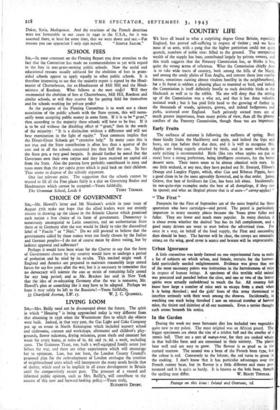SCHOOL FEES
SIR,—In your comment on the Fleming Report you draw attention to the fact that the Committee has made no recommendation as yet with regard to the fees in non-grant-earning public schools. Now the social and educational reasons usually adduced for the abolition of fees in grant- aided schools appear to apply equally to other public schools. It is therefore interesting to see that the majority report is signed by the Head- master of Charterhouse, the ex-Headmaster of Mill Hill and the Head- mistress of Roedean. What follows at the next stage? Will they recommend the abolition of fees at Charterhouse, Mill Hill, Roedean and similar schools, or will they reserve the fee paying field for themselves and for schools working for private profit?
As the purpose of the Fleming Committee is to work out a closer association of the public schools with the State system, this will neces- sarily mean accepting public money in some form. If it is to be "grant," then according to the majority these schools will have to be free. If it is to be aid without the ditabling effect of " grant," then in the words of the minority: " It is a distinction without a difference and will not bear examination in the light of equity." Your Loulinent implies that the Direct-Grant Schools get " extensive help." In many cases this is not true and the State contribution is often less than a quarter of the cost and in all the schools concerned less than half the cost. In fact the State gets a very good bargain. It should further be noted that the Governors own their own corpus and they have received no capital aid from the State. Also the parents have probably contributed in rates and taxes more than the per capita grant which is paid back on their children. That seems to dispose of the subsidy argument.
One last relevant point. The suggestion that the schools cannot be trusted to fill all the Free places fairly is a slur on Governing Bodies and Headmasters which cannot be accepted.—Yours faithfully,


























 Previous page
Previous page